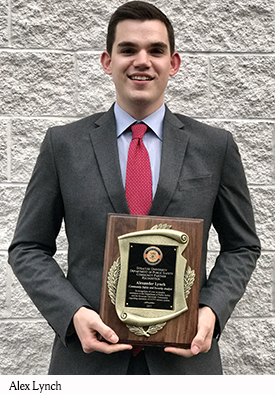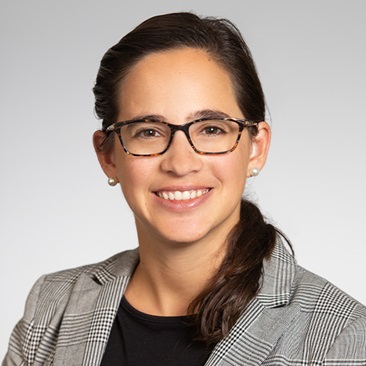Alumni Spotlight: Alex Lynch '16 Brings Maxwell Lessons to the NYPD
September 21, 2021
He credits his citizenship and civic engagement senior action plan with shaping the course of his professional career.
 As
a crime analyst for the New York Police Department, Alex Lynch ’16, uses
the skills he developed in the citizenship and civic engagement (CCE) program in
the Maxwell School to help improve engagement, investigations and the distribution of vital personal protective equipment (PPE) for
frontline workers in New York City during the COVID-19 pandemic.
As
a crime analyst for the New York Police Department, Alex Lynch ’16, uses
the skills he developed in the citizenship and civic engagement (CCE) program in
the Maxwell School to help improve engagement, investigations and the distribution of vital personal protective equipment (PPE) for
frontline workers in New York City during the COVID-19 pandemic.
As a Maxwell undergraduate studying political science and CCE, Lynch initially imagined himself working in environmental infrastructure, but over the course of the program, he developed new passions and skills that led him to his dream job at the NYPD.
Since October 2017, Lynch has worked for the NYPD as a crime analyst. Starting in the 79th precinct in the crime analysis unit and working in various assignments including the Office of the Chief of Department’s CompStat Unit. He currently supports a unit combatting gun violence. Each step of the way at the NYPD has been filled with engaging, meaningful work for Lynch as he continues to use analytics to help reduce crime.
Lynch’s analytical skills were put to use in a different way during this past year after being chosen to help support the city’s PPE Supply and Distribution Task Force.
Lynch leveraged and built upon the skills he acquired from his time at Syracuse
University’s Department of Public Safety and the NYPD to help the task force effectively
oversee the distribution of tens of millions of pieces of PPE to hospitals and
healthcare facilities in New York City—working 45 days straight from 6:30 a.m.
to 8 p.m.
“If there’s something you’re passionate about, don’t give up on it. Don’t do it for a grade. Focus on having a goal that will bring about real changes and then figure out what research you need to do to make it happen.”
Alex Lynch '16 B.A. (PSc/CCE)
Finding His True Passion
Lynch credits his CCE senior action plan with shaping the course of his professional career, as it led him to research off-campus crime and to a job at DPS to implement his plan and ultimately to working at the NYPD.
“My CCE project is what brought me to DPS and crime. Once I began work at DPS and gained exposure to investigations and crime analysis, that really piqued my interest in the field and made me want to go further,” says Lynch.
CCE students typically spend their junior year researching an issue they care about and then, in their senior year, create a plan to implement a project with an organization that alleviates the societal problem they researched. Students have recovered food waste on campus to donate to local agencies, designed a tutoring program for local refugees by linking them to students in upper-division Arabic classes, and many other projects that continue to have long-lasting impact on Syracuse communities. Lynch’s plan is no different, as it ultimately led to his post-graduate job and future career trajectory and continues to impact Syracuse University students to this day.
While living off campus during the summer of 2014, Lynch was the only person in his off-campus house when someone broke into the apartment below Lynch’s, kicking in the front door to the unit as Lynch was home. Friends told similar stories of off-campus theft—cars getting broken into, bikes being stolen and other experiences with off-campus theft. This all fueled his desire to do more than what was currently being done to increase security in off-campus neighborhoods. After extensive research, Lynch’s plan was to outfit 10 telephone poles with cameras linked to the Syracuse Police Department, each pole equipped with one to five cameras, in the off-campus neighborhood. And he made it happen.
After garnering support from the Syracuse University administration with help from CCE faculty, Lynch stayed after graduation for 14 months working for DPS as an analyst to ensure full implementation of his CCE action plan. This work included securing the funds for the project, totaling over $120,000. After securing about $54,000 from donors, including Syracuse University, Student Association, and SUNY College of Environmental Science and Forestry (SUNY-ESF); about $40,000 from landlords; and more than $26,000 from the Syracuse Police Department, the Syracuse Common Council unanimously approved to accept the funds and implement the project. His CCE action plan had been fully realized.
While working for DPS, Lynch was exposed to opportunities outside of his action plan, as well. He began his journey in crime analysis at the University. One of his proudest moments was using his newly minted analytical skills to identify and locate a vehicle used in a serious off-campus crime, which ultimately helped the Syracuse Police Department apprehend the perpetrator. Moments of direct impact, like this one, made it clear to Lynch that crime analysis was his future.
Through the experience, Lynch learned the importance of finding your true passion and how the CCE program sets you up to find it, pursue it, and do something about it. Seemingly a straightforward path in safety and security, Lynch actually spent nearly three of his four years at Maxwell envisioning a career in green infrastructure. However, when discussing his CCE action plan with Ajello Professor in Energy and Environmental Policy Pete Wilcoxen, the two discovered that Lynch’s passions were elsewhere and Wilcoxen encouraged the shift.
To the current students, Lynch says: “If there’s something you’re passionate about, don’t give up on it. Don’t do it for a grade. Focus on having a goal that will bring about real changes and then figure out what research you need to do to make it happen."
Related News
School News

Dec 19, 2024
Research

Dec 16, 2024
School News

Dec 11, 2024
School News

Dec 10, 2024